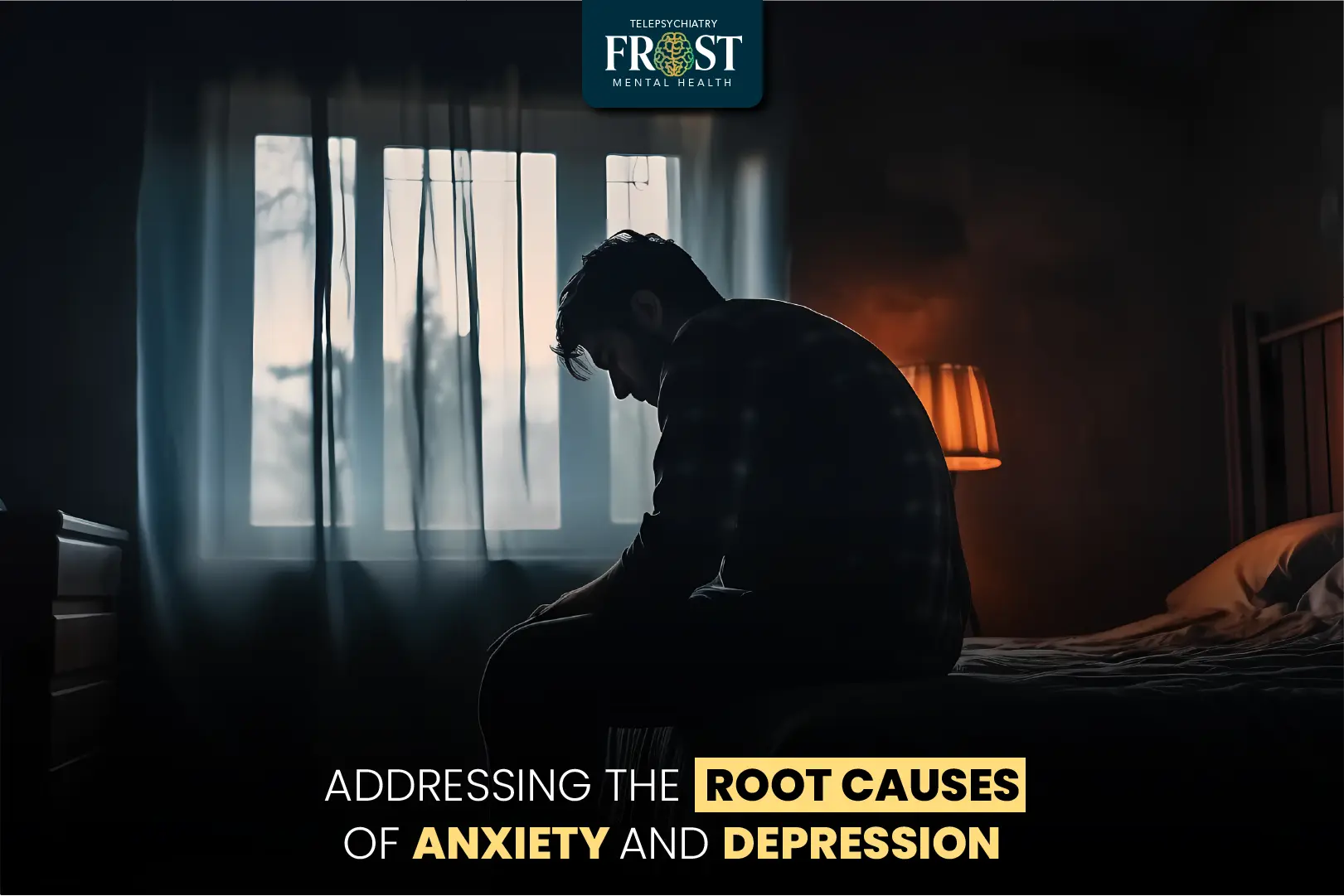Today, anxiety and depression have become alarmingly common.
Many people grapple with these mental health issues every day, hoping to find solutions.
Common treatments are medication and therapy, but recognizing and tackling the root causes can make a real difference.
Let’s discuss depression and anxiety, and how to address their root causes.
Understanding Anxiety and Depression
What is Anxiety?
Anxiety isn’t just stress but a powerful sense of dread that creeps into everyday life, including symptoms like constant unease, a rapid heartbeat, and excessive worry.
What is Depression?
This condition includes persistent sadness, loss of interest in things you once loved, and even physical signs like tiredness or altered eating habits.
It’s more than typical sadness, it’s a heavy burden that can seriously affect how well you live your life.
Common Causes of Anxiety and Depression
- Biological Factors
The brain is a complex organ and imbalances in neurotransmitters, like serotonin and dopamine, may cause anxiety and depression.
Your genes and family background matter too; if one of your relatives has mental issues, that could affect you as well.
- Environmental Factors
Where you live and what you encounter plays a part. Stressful times, like losing your job, relationship breakdown, or traumatic experiences can trigger anxiety and depression.
Also, isolation or witnessing violence can make things worse.
- Psychological Factors
Negative thought patterns and low self-esteem can feed anxiety and depression.
Those who always view themselves and the world negatively are more likely to struggle with these feelings.
- Lifestyle Choices
Choices like bad eating habits, not exercising, and using harmful substances can add to the rise of anxiety and depression.
Sitting around frequently and eating poorly can trigger physical health issues which can put mental health at risk.
Addressing the Root Causes of Anxiety and Depression
- Biological Approaches
- Medication: Sometimes, addressing the brain’s chemical imbalance through medicine is needed. Antidepressants and anxiety-combatting medicines can help manage these signs.
- Hormonal Balance: Addressing hormonal imbalances can ease the signs, specifically in women. Checking with a medical professional for hormone therapy could be helpful.
- Environmental Adjustments
- Creating a Supportive Environment: Having supportive people around you can bring a real change. Joining local activities or support groups can infuse you with a feeling of unity and empathy.
- Changing Stressful Situations: Recognizing and shifting stress-causing elements in your life like unhealthy work conditions or toxic relationships can lessen anxiety and depression.
- Psychological Strategies
- Cognitive Behavioral Therapy (CBT): This therapy works wonders in shifting negative thinking and behavior. It enables people to form coping techniques and healthy thought patterns.
- Mindfulness and Meditation: Engaging in these activities can enhance concentration on the present moment, decrease stress, and heighten self-perception.
- Lifestyle Modifications
- Exercise: Move around often. It helps you feel good by releasing endorphins. It also betters sleep, lessens stress, and uplifts confidence.
- Healthy Eating: A balanced diet rich in omega-3 fatty acids, vitamins, and minerals supports brain health. Whole foods, fruits, and vegetables can help improve mood and energy levels.
- Limiting Alcohol and Drugs: Less or no use of alcohol or drugs can prevent anxiety and depression from getting worse.
Seeking Professional Help
Self-help methods are useful, but often a professional’s insights are needed. Therapists can offer the right tactics for individual issues.
They can aid in spotting the main problems and crafting an effectual treatment plan.
The Importance of Early Intervention
Prompt action can stop anxiety and depression from getting worse. Spotting signs early and getting help can result in better results and a better life quality.
To Conclude
Addressing the root causes of anxiety and depression is crucial for lasting recovery. Grasping these causes and using successful tactics can pave the way to a healthier, more satisfying life.
If you or anybody you know is having a hard time, think about getting expert advice.
At Frost Mental Health, our dedication is to extend a warm, professional hand to aid your mental health path.
Reach out to us to gain more knowledge about how we can help you in beating anxiety and depression and finding the route to wellness.
FAQs
What is the root cause of anxiety and depression?
Anxiety and depression mostly result from genetic, biological, environmental, and psychological effects.
Brain chemical imbalances, family health history, life stressors, and harmful thought cycles commonly cause these mental health issues.
How do you address anxiety?
Managing anxiety requires lifestyle modifications, therapeutic interventions, and, when needed, medication.
Practices like mindfulness, physical activity, and cognitive-behavioral therapy (CBT) alleviate symptoms.
Building a comforting environment and reaching out to mental health professionals are equally essential.
What is the 3 3 3 rule for anxiety?
The 3 3 3 rule is a grounding method for managing anxiety. You begin by identifying three things you see, then notice three sounds, and lastly, you move three different body parts.
This tool can regain your attention to the here and now.
What is the root cause of health anxiety?
Health anxiety or illness anxiety disorder is generally born out of an intense consciousness about body health, paired with the habit of catastrophizing this awareness. It may be provoked by earlier illness experiences, family health history, or continuous stress and anxiety.




No comment